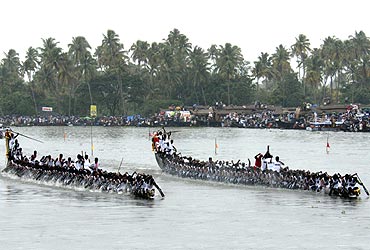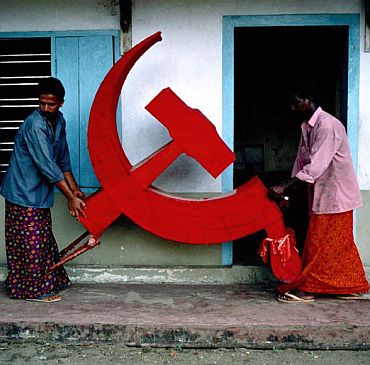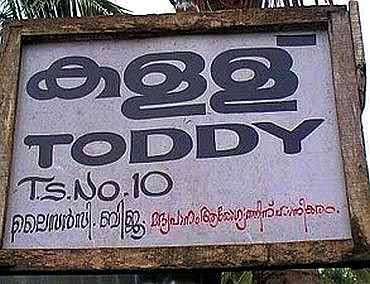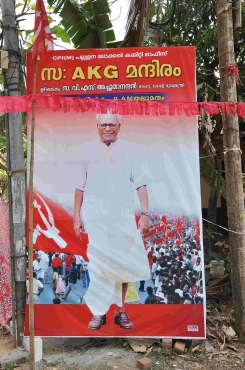Photographs: Dipak/Reuters
M K Bhadrakumar, who is in Kerala covering the election, offers his take on how the importance of politics is receding for the average Malayali.
Among the perennial passions of the people of Kerala, politics in the conventional sense steadily declined in the order of priority through the recent decade or two. Most of the time it takes a back seat and remains in hibernation except as an adjunct to the abiding passions of Malayali life -- consumerism, sex, sleaze or booze.
But in election time, it surges forth and takes the lead for a period of a month or so, which harks back to an earlier era when the Malayali breathed the air permeated with politics and lived in a perpetual state of high voltage intellectual excitement.
The heart of the matter is that the Malayali has 'outgrown' politics. He has no more need of politicians, expect selectively -- in terms of getting a sanction letter from the municipality for house construction, transfer of job for a nephew from the present location to somewhere nearer home, etc.
The great transformation in production relations that the state witnessed in the downstream of the historic oil boom of the early 1970s in the Persian Gulf region bypassed the state's political parties and took place despite the political parties.
People who have been drifters with no particular sources of income have suddenly built mansions in their villages and travel to the nearby town and cities in Honda or Skoda limousines. The commonest grievance of the Malayali is that the roads connecting his home need to be in better condition or that his fast cars and SUVs simply deserve to have better roads.
In sum, life is good
Image: Not too many parents send their children to government schoolsPhotographs: Arko Datta/Reuters
Private schools imparting quality education have sprung up even in small inner towns and the school bus ferrying children from the remote villages is a familiar sight in the mornings and afternoons. Parents give wide berth to the government schools if they can help it and the admission rate in government or government-aided schools has been steadily dropping.
The malls and shopping complexes (and bars) are crowded with customers at all hours. The consumption of meat and beef has sharply increased. Today, the Malayali ranks number one in the world in his intake of alcohol. Whereas the traditional Malayali value system abhorred alcohol consumption, today it is a disgrace if 'drinks' are not offered at home to a visitor.
In sum, life is good from all appearances. A casual labourer commands a daily wage of Rs 500. By the standards of North India, he is eligible to be a member of the 'Rising India'. A labourer who plucks coconut trees charges Rs 50 per tree. That is to say, if he works for a couple of hours in the morning from 8 am to 10 am or so, he would earn to the tune of Rs 500.
Naturally, he must have chicken or fish curry for lunch every day. He has a few pegs to drink every day in the nearby tavern. He travels to 'work' on his own motorbike. (A retired vice-chancellor had the startling experience of one labourer turning up for work with his team in an Ambassador car.) He owns digital cameras, DVDs and LCDs, the whole works.
Why can't we find a contented Malayali?
Image: A houseboat owner steers his boat in the backwaters near CochinPhotographs: Pawel Kopczynsk/Reuters
However, the intriguing fact is that one seldom comes across a contented Malayali amidst all this 'prosperity'. The average Malayali invariably harbours a grouse or two against all others -- politicians and bureaucrats alike, and if nothing else about his neighbours.
He is unhappy with the state of the world around him and he is willing to share the unhappiness at the drop of a hat in any casual encounter. He apparently lives a good life but his life has its own tensions. His constant compulsion to hide his insecurities adds to the tension.
He only knows he is able to 'live it up' almost entirely due to the various welfare loans and grants provided under various government programmes or the income he receives through remittances from the Persian Gulf countries.
The stark reality is that there is still a lot of poverty amidst the process of what an intellectual here termed the relentless 'middle-classisation' that has been going on in the society.
The Malayali goes to an extraordinary extent to 'live it up' and he camouflages through conspicuous consumption the insecurities of his ephemeral world. Quite possibly, this is in some ways an atmosphere of fin de siecle -- a mixture of opulence and decadence, where a vibrant cultural era dating back to the 1930s and 1940s in its origin has definitely drawn to a close and an ominous and anticipative air of excitement, hope, despair and melancholia uneasily prevails.
An enormous tension is building up within the average Malayali. Which probably explains the unprecedented scale of the work of the renovation and revival of temples which is taking place and the founding of new religious institutions that is regularly reported. Such explosive scale of 'religiosity' appears at first glance to be a contradiction for a society that is so hopelessly steeped in the consumerist, materialist culture.
The Congress, Communists cannot grow politically
Image: A CPI-M office in KeralaActually, what may appear as a contradiction is the manifestation of an inexorable process of societal disintegration that has been going on in the recent decades. Many factors could be attributed to this societal disintegration -- the rapid 'middle-classisation' process, the cascading 'casteist' sentiments and communal feelings in an overall environment of uncertainties and identity crisis, and of course, globalisation and its cultural fallouts.
But one central factor has been the stagnation stemming from the utter predictability of the entrenched coalition politics in the state in the recent decades. Unsurprisingly, politicians in Kerala have a daunting challenge in the run-up to the elections. They find it an uphill task to win the confidence of the voter.
If in the 1950s and 1960s, the two main political parties, Congress and the Communists, were engaged in a struggle to mutually vanquish each other, a realisation eventually dawned on both sides that it was a futile exercise after all. The result has been the coalition politics where both Congress and the Communists have avidly taken to the Marxist-Leninist principle of forging united fronts and operating through such fronts so as to optimise their vote gathering capacity and to register a larger-than-life presence on the political landscape.
The hard reality is that there is no more political space for the Congress or the Communist parties to 'grow' anymore in Kerala. In the past couple of decades especially, the two united fronts, led respectively by the Congress and the Communist parties, have been locked in a relentless struggle to gain marginal ascendancy over the other in votes, which is sufficient enough to capture power. On one occasion, it was all a difference as small as 1 lakh aggregate votes.
Ideology has taken a back seat
Image: A floral decoration event held for Onam festival in KeralaPhotographs: Reuters
The result is that even a tiny interest group gets assiduously courted. The political scene comes alive during election time as the contestation for getting the 'edge' happens to get desperate. The final lap of the election campaign, the final week in particular, becomes particularly animated since a new phenomenon is that the Malayali 'swing voter' has become impulsive and is highly susceptible to the television channels.
Both united fronts have large 'committed' blocs of voters and the contest is actually limited to attracting the slice of 'swing voters' who account for less than 10 percent of the electorate. Ideology has taken a back seat and the raison d'etre of both fronts is projected as respective alliances forged with the mission to advance the 'development' of the state.
In sum, politics has retreated in Kerala or to put it differently, the people have 'outstripped' the politicians -- depending on one's point of view -- and unlike the dialectics of the struggle 40 or 50 years ago, the dominating thesis no longer comprises calls for social justice, egalitarianism, etc.
The dominating themes are of 'development' -- how many bridges will be constructed, how much efficiently potable water ought to be distributed, how securely the women's modesty could be safeguarded in the male-dominated Malayali society, etc. It almost seems from the ongoing political campaign as if there is no more any class conflict in Kerala.
Nonetheless, politics excites the Malayali. Seventy to seventy-five percent of the electorate will definitely cast their vote. People are not indifferent although their belief in ideology has dissipated and the election campaign doesn't witness any great debates that provoke his thinking or sway his political instincts.
Malayali gets greatly excited by the scandals of sex or money
Image: An alcohol shop in KeralaThe local issues are the prime concerns -- the state of the roads, the repair of the culvert, the renovation of the local bus depot. The concerns remain acute but they have become localised. True, the Malayali gets greatly excited by the scandals of sex or money or sleaze involving local politicians but he is indifferent to the great scams of the darbar in Delhi -- 2G, CWG, etc.
There is a total absence of serious debates. Equally, it is all but clear that both fronts are certain to offer political stability to the state. Curiously, the issue of 'stability' no longer figures in Kerala.
Most observers agree that it is going to be a 'tough fight' in the upcoming election. However, what lends an extra dimension to the 'tough fight' is that there has been an unprecedented scale of communal polarisation on the Kerala political landscape not witnessed in the entire period since the so-called anti-Communist 'liberation struggle' that overthrew the first Communist government in 1959.
The Congress-led front has forged a formidable alliance that includes parties that count on heavy support from the Christian and Muslim communities who account for 45 percent of the population. Arguably, this is a sound election strategy in the tussle to get a decisive edge over the Left front, which is left to primarily bank on the disunited Hindu voters and the dispossessed and poorest sections of society plus stragglers from the Christian and Muslim communities.
But it has further reinforced a nascent resentment among the Hindu communities that the Christians and Muslims have become the 'ruling class' in Kerala politics whereas they have been relegated to 'second-class' status. Whether this brewing Hindu resentment translates as protest votes or, conversely, to what extent the Congress-led front has consolidated the Christian and Muslim voters remains to be seen.
VS remains a magnificent exception
Image: A poster of Kerala CM V S AchuthanandanPhotographs: Shobha Warrier/rediff.com
Statistically, Congress-led front holds the advantage considering that the Christian and Muslim communities have a tendency to vote in unison, en bloc, while the Hindu community is badly splintered along caste lines. However, the Left has a trump card, too.
Towering above the sectarian passions and subsoil politics stands the 'clean' political personality of veteran Marxist leader V S Achuthanandan, whom Communists, non-Communists and anti-Communists alike affectionately call 'VS'.
In Kerala's post-modern politics, where ideology is receding as a distant memory, VS remains a magnificent exception and his pull at the heart of the common people cannot be denied no matter their caste or religion -- including his detractors within his own party establishment who constantly harassed him, booby-trapped him or mocked at him in public and in private when he was in office as the chief minister through the past five years.
There is great dramatic irony insofar as at the end of the day it is precisely how this 87-year old talisman of the Left will 'swing' the Malayali mind (and hearts) in what is undoubtedly going to be his last tryst with electoral politics right at the very fag end of his tumultuous seven decades in politics is what is giving the most poignant touch to the 'tough fight' of Kerala's postmodernist politics this week.
All accounts are that VS is 'connecting' with the people and the point is, there is no real antipathy toward the government he led for the past five years -- 'anti-incumbency', as we call it. This is the first time one can recall that the Left front's election holdings and banners carry just one image that conveys all that is needed to be told -- VS' image with his trade mark laughter and his right hand held up greeting the people of Kerala.








article